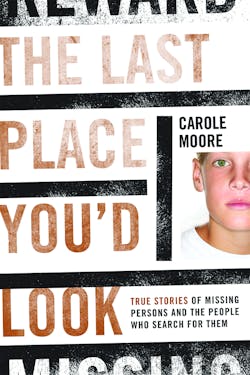"The Last Place You'd Look"
Former police detective Carole Moore interviewed the families of dozens of missing persons across the county and around the world to compile The Last Place You'd Look, which also focuses on the efforts of police, search and rescue, nonprofits and volunteer organizations. According to the National Crime Information Center (NCIC), there are about 100,000 active, open and unresolved missing persons cases that sit on the books in the U.S. each day. The numbers are similar in Canada, where annually more than 60,000 children are reported missing. Additionally, in the U.S. alone there are more than 40,000 John and Jane Does in cemeteries and morgues across the country, still waiting to be identified. The anguish of having a loved one vanish is unthinkable, yet thousands of families face this heartbreak every day. The Last Place You'd Look provides searchers a starting point and gives readers an overview of "the club no one wants to belong to."
What happens when a non-custodial parent kidnaps her son? Or a college student vanishes after a night out with friends? Or a middle-aged man seemingly drowns in calm waters? What do family members, friends, and law enforcement do when a beloved goes missing? Here, Moore explores an array of missing persons' scenarios, using real life stories, to uncover the various ways that people go missing, the efforts made to retrieve them, the emotional fallout for family and friends, and the difficulties and challenges such cases present for all involved. She covers parental abductions, intentional disappearances, stranger abductions, the missing and mentally ill, runaways, foul play, and other situations where people go missing. In addition, the criminal justice approach to missing persons is discussed, as Moore looks at the science of missing persons (DNA, forensic dentistry, etc.), resources for family and friends, national organizations such as the National Center for Missing and Exploited Children, and other groups involved in searching and recovering loves ones. Here, readers will discover how people are found, how missing persons' cases are treated, and how and why some stories have happy endings and others do not.
